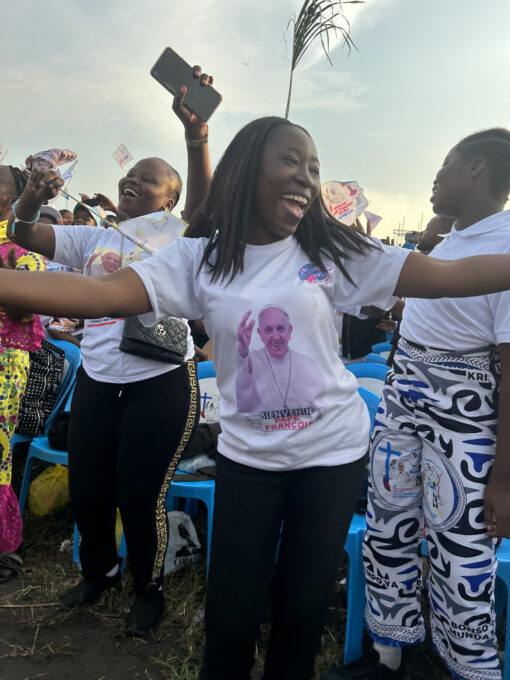
Before the journalists climb up the back stairs of the papal plane at the start of an international papal trip, the Vatican takes away our passports, hands us the press passes we will need in the country we are visiting, the Pope’s speeches for the first day and copies of the telegrams sent to the leaders of each country we will be flying over.
For this Africa trip the three pages of telegrams I clutched as we found our seats in the back of the huge A350 Airbus provided by ITA Airways (and paid for handsomely by the traveling press corps, a total of 5100 euros/person for the six days and three flights) indicated that we were going far away.
The Pope sent a combination of messages: blessing for peace and harmony, abundant divine blessings, prayers for reconciliation, strength, wellbeing, joy, and prosperity to the leaders of Tunisia, Algeria, Niger, Chad, the Central Africa Republic, and Cameroon. Each telegram was address to “His Excellency” as the leaders of all the countries we passed over are men.
Kinshasa is a long way from Rome, and a world apart.
As I discussed in my earlier post – Pope Francis heads to the Democratic Republic of Congo and South Sudan – the DRC and South Sudan are two of the poorest nations in the world, both caught up in armed conflict, struggling with hunger, illiteracy and poverty. Both countries are blessed with natural resources, and burdened with foreigners who want to exploit them, and with corrupt leaders ready to pocket the wealth.
Despite the poverty, corruption and violence in the countries we visited, the youth and energy in Africa was palpable, the atmosphere joyous.
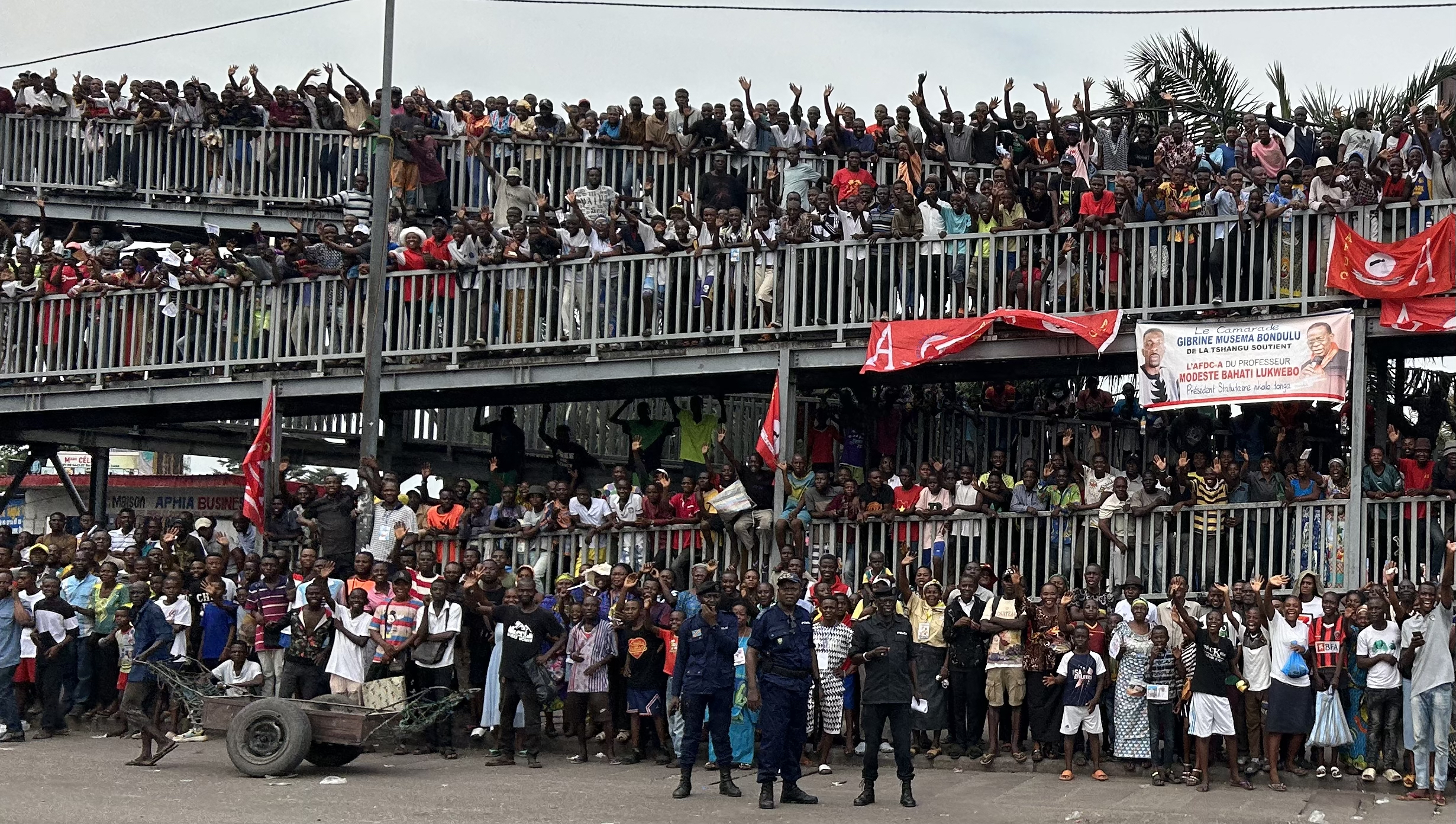
As our minibuses were escorted along the roads of Kinshasa to the Presidential Palace, tens of thousands of people lined the roads and crowded on to overpasses greeting us enthusiastically. I opened the window of our airconditioned van and reached out to wave to the children along the way, every wave was greeted with a roar of cheers. Pretty soon all the photographers were sticking their lenses out the windows to capture the enthusiasm.
(By the way, there were few cell phones in sight, just pure, glorious human interaction without an electronic device in the middle.)
In our three days in Kinshasa, we were surrounded at Masses and papal events by high-spirited, animated crowds. I particularly enjoyed using my mediocre French to interview the women, often dressed in outfits with photos of Pope Francis emblazoned on them.
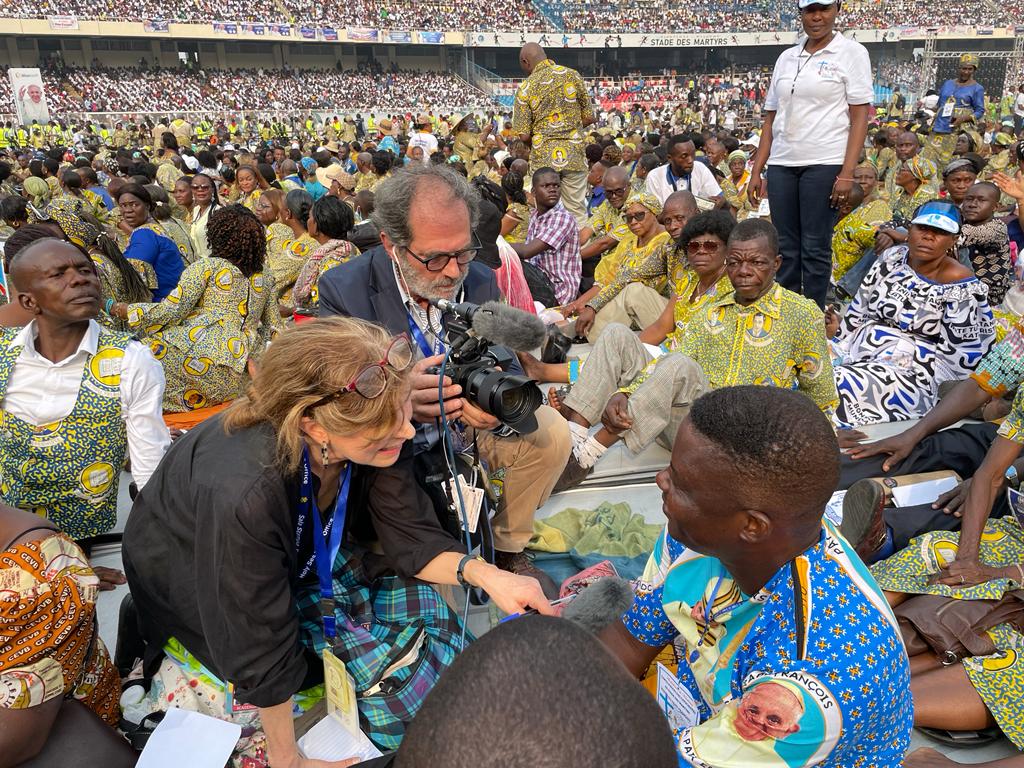
I loved awatching a group of women at the stadium in Kinshasa do a little dance and sing a song which more or less said, “we are going to take our problems, wrap them up and give them to Pope Francis and send them back to Rome,” this complete with a gesture of balling up their invisible problems and throwing them into the distance.
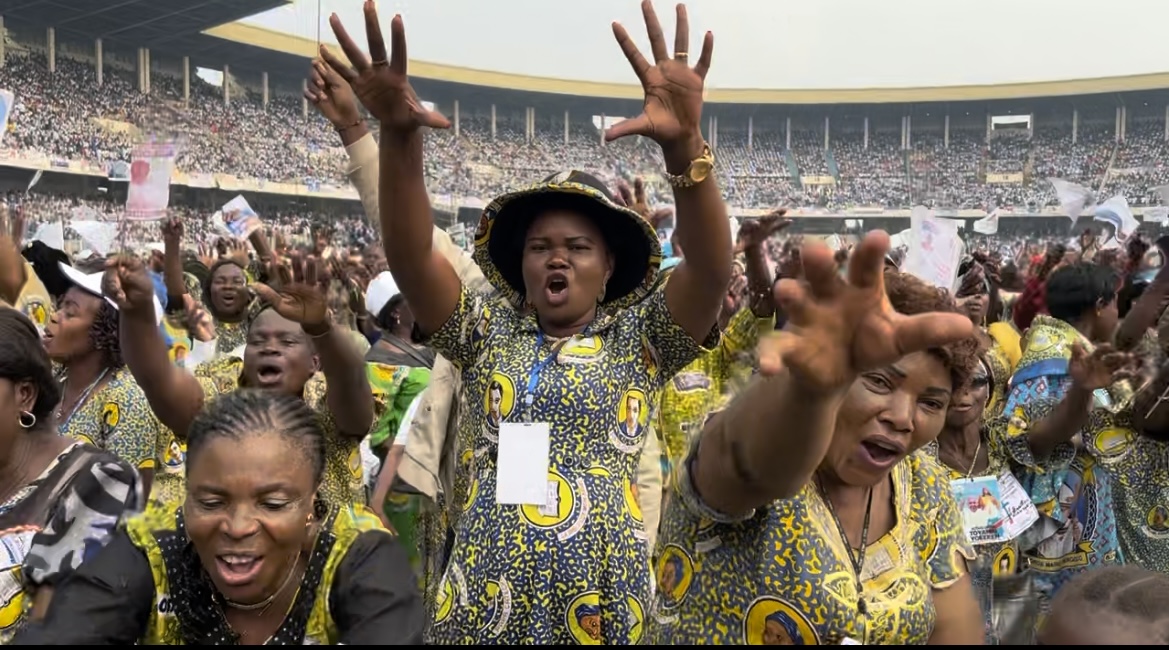
At a morning Mass for the hundreds of thousands of people held on the fields and runways of an airport in Kinshasa, we were able to enjoy a show of singers complete with a dancer who could have given Michael Jackson a run for his money.
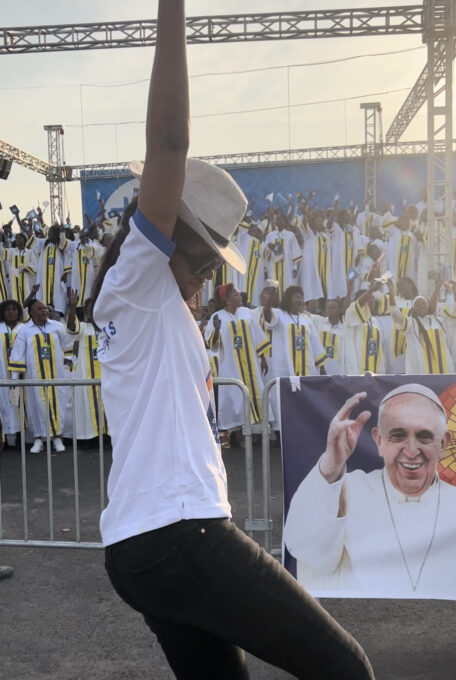
While the Pope was clearly buoyed by the exuberant crowds, his visit was intended to address the country’s predicaments, and he did not hold back. In his first speech at the presidential palace, he used strong language to condemn the exploitation of the Congo.
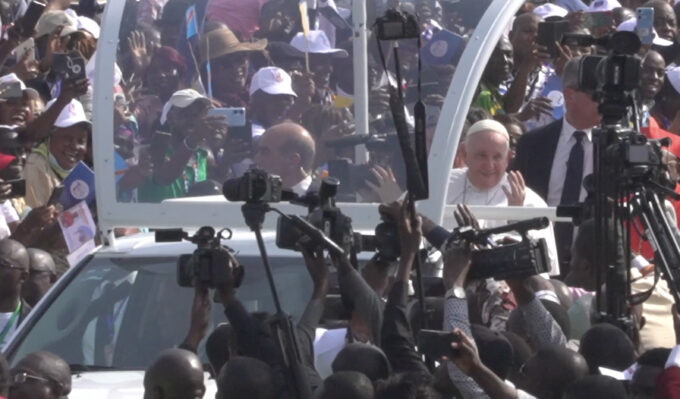
“It is a tragedy,” he said, “that these lands, and more generally the whole African continent, continue to endure various forms of exploitation. Political exploitation gave way to an “economic colonialism” that was equally enslaving.”
The Pope was referring to the many foreign nations that are eager to exploit the Congo’s vast mineral wealth – the gold, diamonds, cobalt, coltan, and copper.
“The poison of greed has smeared its diamonds with blood,” the Pope declared before demanding “Hands off the Democratic Republic of the Congo! Hands off Africa.”
At these words the crowd of government officials and diplomats present broke into applause. But the Pope, who was speaking in Italian, while the others were listening to simultaneous translation in French, ploughed on quietly.
“Stop choking Africa: it is not a mine to be stripped or a terrain to be plundered,” he said.
Eastern Congo is rich in diamonds, coltan, cobalt, copper, and gold. Coltan is used in smart phones and other electronic devices; cobalt is used in batteries for electric cars making then both highly coveted minerals in the 21st century and attracting eager foreigners ready to plunder Congo’s wealth. According to Amnesty International, workers in mines in the Congo, including many children, earn from $1 to $3 per day for back-breaking work.
The Pope had originally planned to visit Goma in eastern Congo but had to cancel that leg due to fierce fighting between armed groups. The area has been plagued by armed conflicts with an estimated 120 armed groups competing for the mineral rich territory. The most powerful rebel group is the feared M23, a group of Congolese ethnic Tutsis who are receiving military support from Rwanda, according to the United Nations. The M23 have been killing civilians and forcing villagers to flee their homes over the past ten years.
According to the UN’s World Food Programme, the conflict in the eastern Congo has forced 5.7 million people to flee their homes, many now live in camps for internally displaced people around Goma. Rebel groups in eastern Congo have used the worst forms of violence against women and children and Pope Francis got to learn about it first-hand from some of the victims. Since he could not go to Goma, on his second day in Kinshasa the Pope met with a small group of these victims who had been brought over from the east at the Nunciature (the home of the Pope’s diplomatic representative – Nuncio – in Kinshasa, similar to an ambassador’s residence).
Several of the victims stood up and told their stories. I was among a small group of journalists allowed in the pool for this event, and it was hard to hold back the tears. A 17-year-old girl named Catarina came to the microphone and as she spoke another young woman held her two baby girls. Catarina recounted how she had gone to fetch water one day with other girls from her village when they were captured by rebels who took them into the forest. The rebel commander chose her to be his sex slave and kept her prisoner and raped her often. After nineteen months, she managed to escape, and later gave birth to her twins. She does not know the fate of her friends.
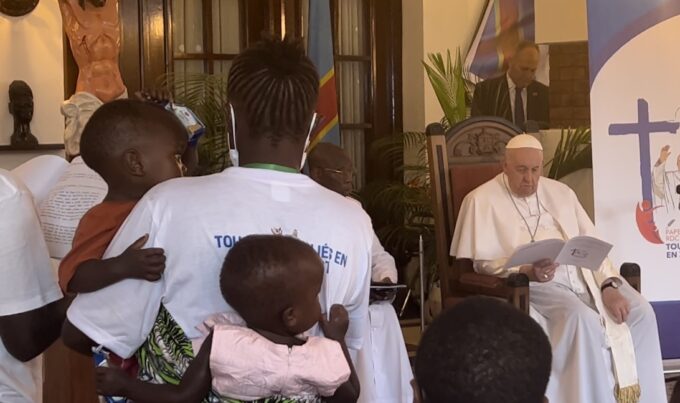
Another woman, Emelda, was similarly captured by rebels at age 16 and used as a sex slave, abused by five to ten men every day. The rebels then made the girls eat the heads of the people they had killed mixed with corn, if someone refused to eat, they were killed. As shocking as this sounded to us, AP’s West Africa Bureau Chief, Krista Larson, confirmed that the UN and human rights groups have documented how forced cannibalism has been used as a weapon of war in parts of eastern Congo.
Three children stood up and described how rebels used a machete to chop their father to pieces as they watched. They put the pieces in a basket and took it away, taking their mother with them. They never saw her again.
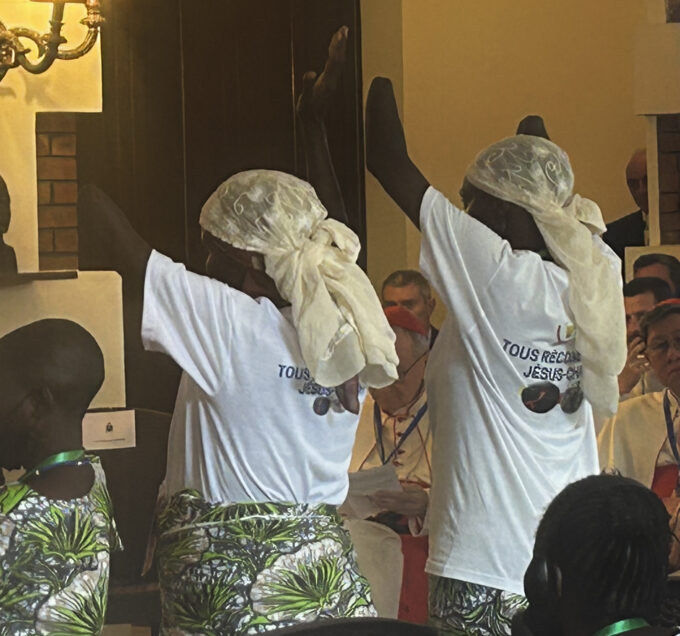
Some women in the group stood and raised up their limbs that had been chopped off by the rebels, leaving stumps. The women then knelt before the Pope for his blessing. Tears filled my eyes as I watched one of them try to grasp the rosary the Pope gave to her between her amputated arms as she made her way back to her seat.
After each victim spoke, as part of a forgiveness ceremony, they placed an object, symbolic of the violence they endured, at the base of a large wooden cross. A young man placed a machete, a young woman a mat like the one on which she has been raped.
When the Pope spoke, he delivered his words quietly, numbed by the intensity of the testimonies he had just heard, “Your tears are my tears; your pain is my pain,” he said, “To every family that grieves or is displaced by the burning of villages and other war crimes, to the survivors of sexual violence and to every injured child and adult, I say: I am with you.”
The Pope’s tone was soft, but his words were not as he went on:
“I condemn the armed violence, the massacres, the rapes, the destruction and occupation of villages, and the looting of fields and cattle that continue to be perpetrated in the Democratic Republic of the Congo. As well as the murderous, illegal exploitation of the wealth of this country, and the attempts to fragment the country in order to control it.”
Following the ceremony, I was able to interview some of the victims in the lush, quiet garden of the Nunciature. Catarina looked at me with big brown eyes and I just wanted to hug her and tell her I understood and not ask questions. She spoke slowly and waited patiently while another woman translated into French saying she was content that the Pope had come and had listened and was hoping that his presence could put an end to the violence. Sadly, I am not so sure it will, but I admire her courage immensely for speaking out.
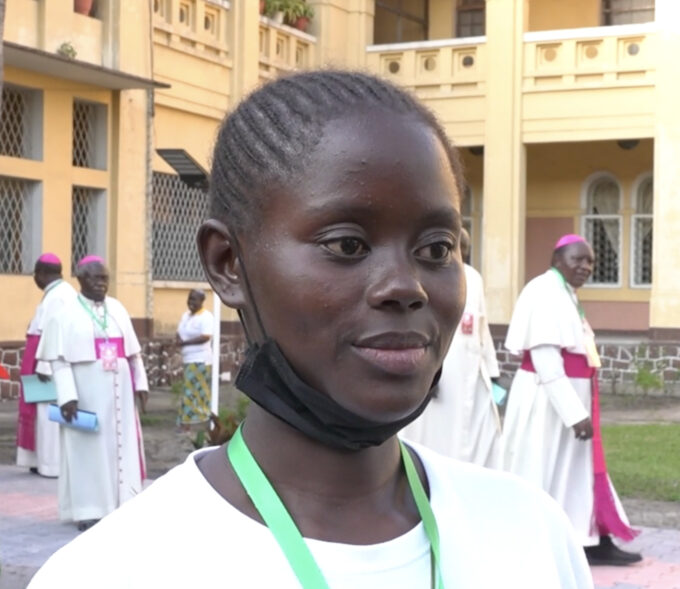
From Kinshasa we departed for Juba, South Sudan. Our plane climbed up over the verdant countryside, and over the immense Congo River with its small green islands as we headed off to the east. About three hours later we descended over a dry, empty landscape finally seeing a little green as the Nile and a few shacks appeared below us. From hot, humid Kinshasa we had arrived in hotter, dry Juba.
The stark differences between the landscape were matched by the differences in the population. The Pope was greeted at the airport by a male honor guard, all of them rail thin and looking about seven feet (2 meters) tall.
As the Pope was wheeled down the red carpet, a woman standing behind a barrier near the terminal yelled out, “We need peace in South Sudan, we need peace for our children.”
I hope the Pope heard her, certainly the press corps did. Unfortunately, for South Sudan’s women, a big problem seems to be the male leadership.
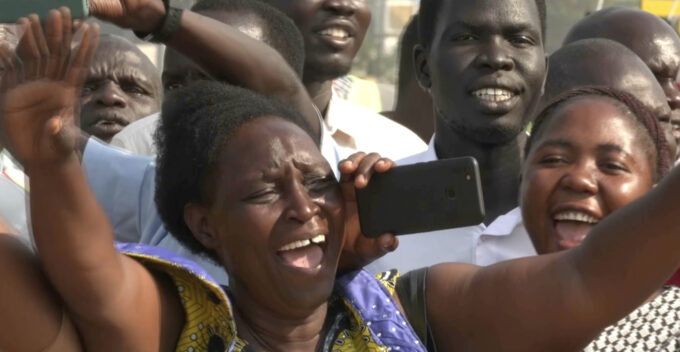
After decades of armed struggle for independence from Sudan, South Sudan became the world’s youngest country in 2011. It only took two years before fighting broke out between armed forces loyal to the Vice President, Riek Machar, of Nuer ethnicity, and an army loyal to the President, Salva Kiir Mayardit, of Dinka ethnicity. The ensuing civil war has left roughly 400,000 dead, children have been forced to become soldiers, and the use of rape as a weapon of war is commonplace.
With the words of the woman at the airport ringing in our ears, we were whisked off to the Presidential Palace for the Pope’s meeting with those two men who seem to be at the center of the problem. In a speech to the Pope, President Salva Kiir Mayardit remembered the 2018 retreat with the other South Sudanese leaders at the Vatican when Pope Francis stunned everyone by dropping to his knees and kissing the feet of the warring leaders and begging them to find a peaceful solution. The President, speaking at the podium, said both he and Riek Machar, sitting in the audience are now working together to implement the “Revitalized Peace Agreement” signed in 2018. According to the peace plan, the country should have held elections in 2023, but now that has been delayed as progress is slow.
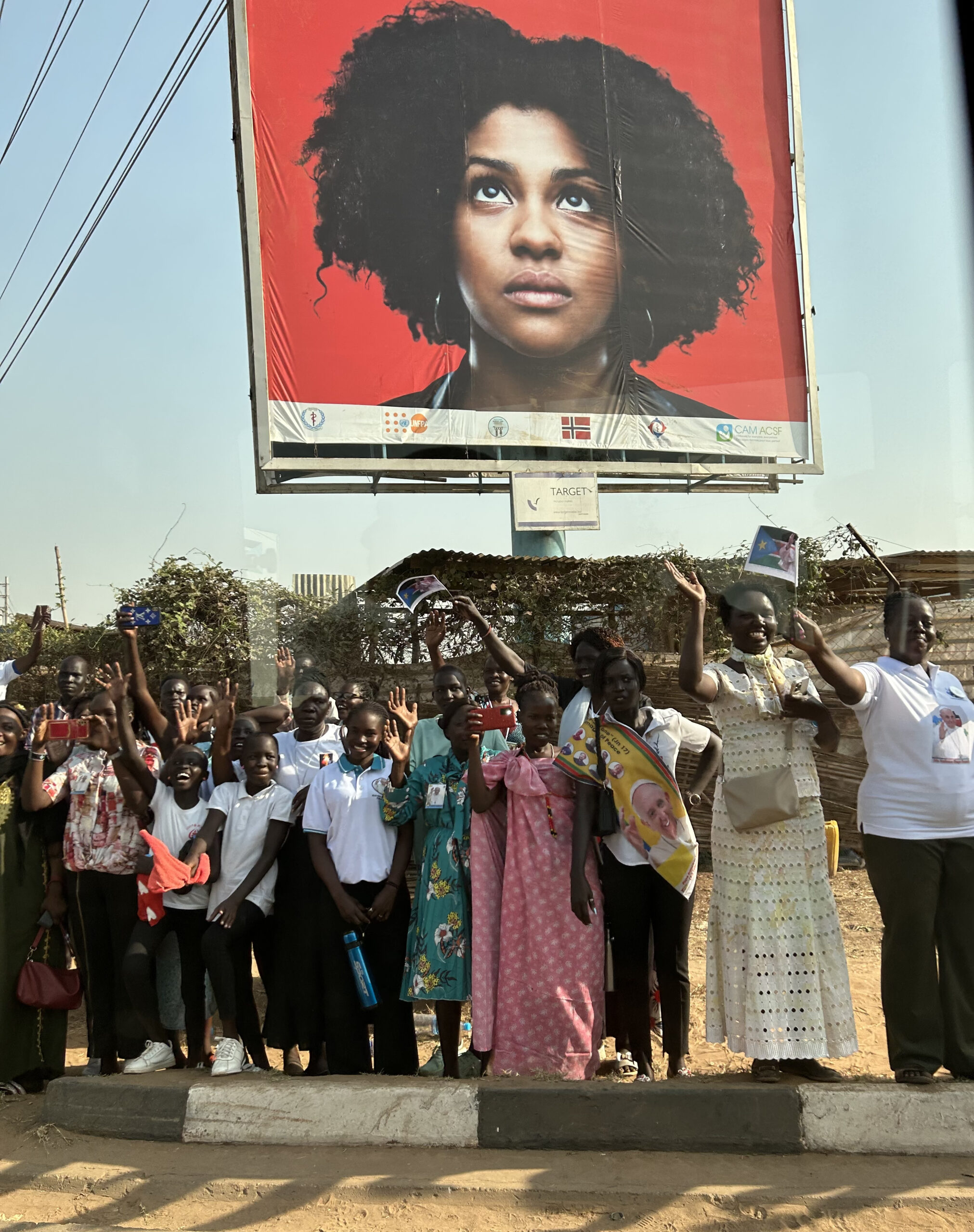
“Dear President and Vice-Presidents, in the name of God, of the God to whom we prayed together in Rome,” began the Pope, “No more bloodshed, no more conflicts, no more violence and mutual recriminations about who is responsible for it, no more leaving your people athirst for peace. No more destruction: it is time to build! Leave the time of war behind and let a time of peace dawn!”
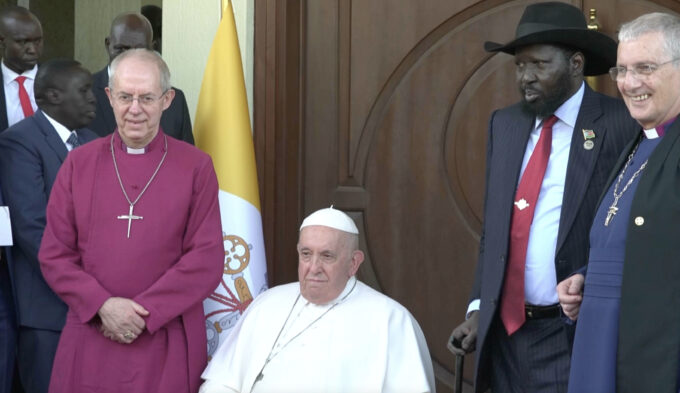
Let’s hope they were paying attention. Certainly, I did not see either the President or the Vice President on his knees kissing the Pope’s feet and thanking him for coming to their country.
While in South Sudan, I tried as much as possible to talk to South Sudanese women and get their perspective.
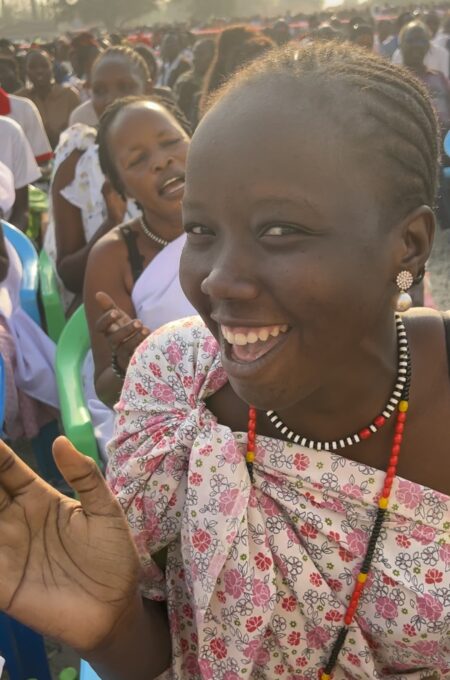
During one of the first events, I was lucky to meet up with Sister Orla Treacy, the Irish Nun who runs a boarding school for girls in Rumbek, about an hour’s flight from Juba. She and her students made a nine-day walking pilgrimage to be in Juba to see the Pope. As we stood in a large open space outside St. Theresa’s Cathedral where hundreds of peoplewere gathered to wait for the Pope, Sister Orla proudly introduced me to her students and explained what they are up against.
Since I am considering this a notebook, rather than an article, I am going to throw Sister Orla Treacy’s entire quotes in here.
“Even today when you look at the statistics for girls, 52-percent of 18-year-old girls are getting married, about 10% of fifteen-year-old girls are getting married. So getting a girl into school was impossible, it has become possible and today you will meet some of the girls who have really achieved and broken through. It is changing, but it is still a big push for girls. A 22-year-old girl going to university is a taboo for many of the society, she should be getting married, she should be getting a dowry, she should be contributing to the family in that way, so it is still a challenge for young women, but it is changing and the young women are now coming with a vision for what they also want for their country as well.”
“We are a collectivist community, so when you accept a girl into boarding school she is the property of her extended family. When she gets married, all the extended family will benefit from her dowry, so when you have a young woman who wants to come to secondary school, traditionally you would talk to the parents, and you would ask the parents if she can come to secondary school. But what we have discovered is that the uncles have a greater influence, so now we have to make sure that when a girl comes to secondary school that the key partners in her life sign to commit that she will not be forced out of school at all for marriage purposes.”
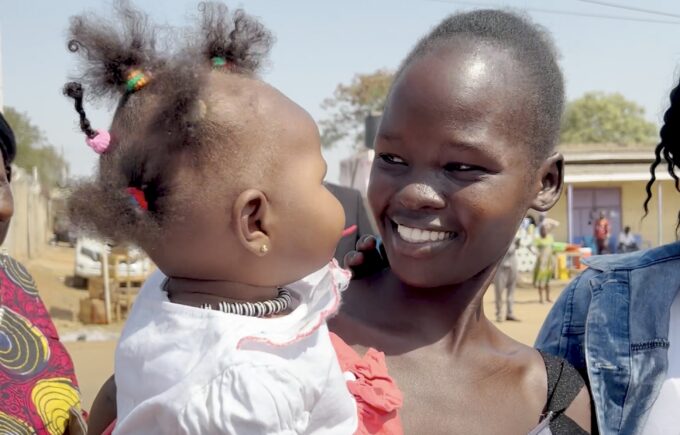
Sister Treacy put me in touch with one of her former students, Elizabeth Nyibol Malou, who is now a lecturer at the Catholic University of South Sudan. Elizabeth came to my hotel one evening so we could chat about the situation of women in South Sudan. She explained to me that she walked 13 kilometers (8 miles) each way to go to school when she was young, but it was worth it. While her friends were all getting married, her parents let her finish her education and start a career. Again, I will put in Elizabeth Nyibol Maloui’s entire quotes below:
“There is a culture of high dowry here where girls can be competed over by two men, or five men can compete over one girl, and a man that can go beyond, you know, the bills, because we place a bill, we have a dowry bill written traditionally. Culturally, it is a norm that is passed down in different cultures of South Sudan, especially the Nilotic communities, and people are invited to compete over a girl.”
Nyibol explained that it is no longer legal to force underage girls to marry but it is still being done because people in the villages are not aware of the law, they just carry on a tradition.
It would be hard enough if the women in South Sudan were just up against cultural traditions, unfortunately their situation has been exacerbated by the brutal civil war combined with devastating floods which has caused a huge displacement of people in South Sudan. With a population of roughly 13 million people, two million are internally displaced and another two million have fled to Uganda, Sudan and Ethiopia.
On the afternoon of his first full day in Juba, the Pope met with 2,500 internally displaced people. As usual, we were taken to the location early and I had plenty of time to talk with women there. A lot of them did not speak English, so communication wasn’t easy. I met a woman named Martha Nyayieg from Bentiu, who had been studying in Uganda when the civil war broke out. She went back to her village but then had to escape into the bush with her father, sister and grandmother when soldiers arrived.
“I think it is by the grace of God that I survived because there were a lot of thousands of people that died,” she said speaking so softly, I could barely hear her, “We kept on hiding ourselves during the day, every time there was an attack we would hide in the villages, in the swampy areas or in the bushes, then we would come back during night. It was very difficult, especially for my father, as a man, to be moving with two young ladies, who could be raped or killed. After three months we managed to escape from our village to Juba.”
After speaking to Martha, I wandered around the room filled with displaced people trying to find other women who spoke English. Many men wanted to tell me their stories, and many women did not want to talk. I eventually found Maria Nyataba Wur who was holding up a sign saying “All my points!! Act now”. I asked her what she meant and she clarified that she only has one thing to say to the Pope “Act now!”
Wur is living in a camp for internally displaced people in Juba, had fled from one area to another to escape fighting and has witnessed the worst of abuse. She told me the grim story of her neighbor, and I will leave her quote as is:
“I proceeded to Malakal, and then again another fighting in Malakal. So our neighbor, she was raped, and that was very terrible because she was raped in front of her children. And she had to flee from where we left from Malakal up to Canal Jonglei. I have witnessed myself how she was supporting herself, she was limping. According to what she told us as a survivor was that they tied her legs apart and then three people entered her, raped her, so there was no injuring we can see physically, because no examination took place but after she approached and we know her and she is our neighbor because we run ahead of her. So when she shared what took place we were really sad. But she was in pain, she was in pain for several days. But after some time I depart with her. I don’t know where is she at the moment.”
Who knows where this woman is, and who can imagine what physical and emotional pain she must still be enduring, of where her children are and the pain and anguish they are living with.
I think Elizabth Nyibol Malou summed it up best, and again, I will leave here entire quote here:
“They’ve been beaten throughout the war from 2013- 2016, women have suffered, they are displaced and they’re exposed now to the situation of war where they are raped, where they are beaten, where they become more vulnerable because they work for the whole family that is displaced, because they’re not living in the original homes, they are living outside the home and they are missing a lot. They spend most of their time working, trying to feed their family and being frustrated because most women are traumatized from war. They have lost everything. They’ve lost their loved one. They are being raped.”
Women like Elizabeth Nyibol Malou, and the other students of Sister Orla Treacy, give me hope. They are smart, determined and have a clear idea of where they want their country to go. If only these women were running South Sudan!
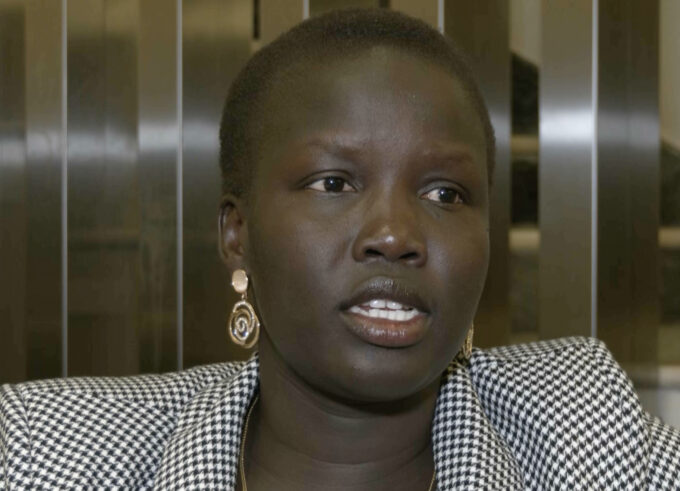
The Pope’s visit to South Sudan was a three day ecumenical pilgrimage together with the Archbishop of Canterbury, Justin Welby, and the Moderator of the General Assembly of the Church of Scotland, Iain Greenshields.
With more than a billion Catholics in the world, Pope Francis was the big shot of the three. He came on the papal plane with his own entourage from the Vatican and a total of 75 person press corps, including writers, photographers, tv producers, video-journalists, and radio reporters. The Vatican press office is a well-oiled machine with the Pope’s speeches delivered under embargo to the traveling press the night before events and a fleet of mini-buses racing through the streets escorted by the police to get us places ahead of the Pope.
The Anglican Church has about 85 million members while the Church of Scotland, according to their website, has about 300,000 members. For obvious reasons, the other two religious leaders left the limelight to Pope Francis, but both of them had powerful statements about peace and women in South Sudan. I was particularly conscious of Justin Welby who spoke out frequently about women, often mentioning the work his wife has done with the women on the frontlines in South Sudan. Welby and Greenshields accompanied the Pope on the flight back to Rome and participated in the inflight press conference with him.

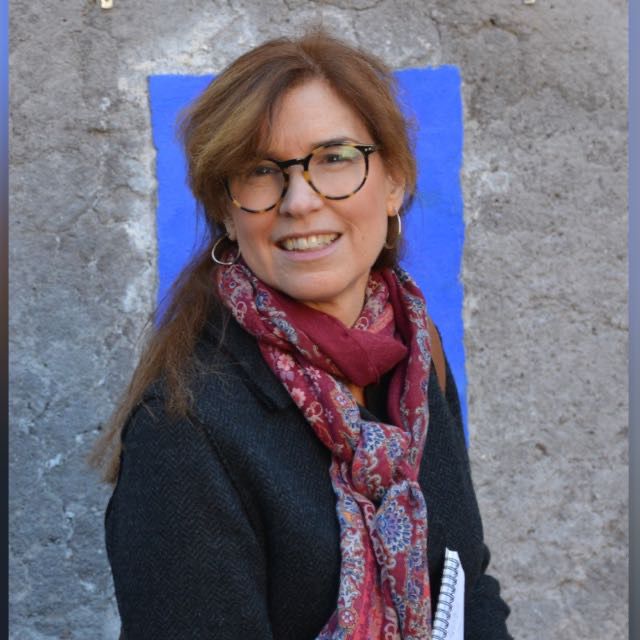
I have tears streaming down my face and my heart is broken. How can we help? Are there corporations to avoid and fight against who use these resources? Are there charitable organizations we can support? Please, please let me know. I can’t give much, but I can give something and support humanitarian companies which don’t exploit people.
Hi Debbie, thanks so much for your comment. Unfortunately, I really don’t know which corporations to fight against and which charitable organizations to support. It is strange because we are talking about minerals needed for smart phones and electric cars. Most of us in the west have smart phones now, and many people are getting electric cars. Are those companies to blame? I really do not know. As far as charitable organizations are concerned, I think the UN is deeply involved in both countries — the UNHCR, the World Food Programme. I also think a lot of Catholic groups like Caritas are doing a lot on the ground. But I have not researched it properly.
Oh, Trisha. I always learn so much from your posts. These are heart-breaking stories, so it’s critical that they are written. Thank you for this.
Kathryn
Thank you, Kathryn. This really wasn’t a proper post, just throwing out a lot of info but I felt a need to do it.
What a joyous crowd greeted the Pope but so very hard to read what horrors some of these women have suffered through.
There better be a hell!
Great to hear from you Lega and relieved to know that my blog has not been eliminated from your email or stuck in your junk box. Thanks so much for reading my post.